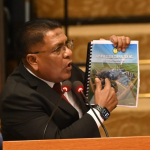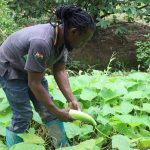With Guyana leading CARICOM in its ambitious goal of reducing its import bill by 25 per cent by 2025, the National Agricultural and Research Extension Institution (NAREI) has launched a hydroponics project in collaboration with private-owned company Victoria Greens.
Hydroponic farming is a cutting-edge, efficient method that allows vegetables to be grown free from sand, dirt and pesticide residuals, ensuring a clean and safe product.
Victoria Green has incorporated Guyanese talents who were part of the Agriculture Innovative and Entrepreneurship Programme (AIEP) in this venture.
President, Dr Mohammed Irfaan Ali accompanied by NAREI’s Chief Executive Officer, Jagnarine Singh on Thursday toured the farm where he was informed on the various operations. The nursery has a capacity of producing 100,000 crops; and as of now, 25,000 crops are being grown. By next week, the full capacity of 100,000 will be achieved.
Crops that are being grown include different varieties of lettuce, pak choi and some 15 high-end herbs that will be supplied to the various restaurants and hotels in Guyana. These include basil, thyme, mustard, and chai among others.
“The intention of this facility is to build additional facilities like this one to meet the entire Caribbean needs for these crops … [we could] export from here and then the next phase is to do the modern aquaculture tanks, “President Ali disclosed while conducting a walk-a-bout at the hydroponics farm.
Youths informed the head of state that the facility is utilising a nutrient film technique, meaning the crops use a nutrient solution to grow, cutting the need for fertilisers.
Additionally, the environment is pest-free, making the crops 100 per cent organic. These cutting-edge technologies are being integrated by the government into the local agriculture system, to increase food production, achieve food security and cut the more than US$5 billion import bill by the Caribbean region.








